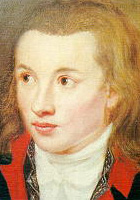Novalis Biography
Georg Friedrich Philipp von Hardenburg (wrote under the pen name of Novalis) was born in Oberwiederstedt, Prussian Saxony, into a family of Protestant Lower Saxon nobility. His father was a director of a salt mine. At the age of ten Novalis was sent to a religious school but he did not adjust to its strict discipline. For some time Novalis lived with his uncle, grandseigneur, who opened him doors to French rationalism and culture. He then went to Weissenfels, where his father moved, and entered the Eisleben gymnasium. In 1790-91 he studied law at the University of Jena, where he met Friedrich von Schiller and Friedrich Schlegel. Novalis completed his studies at Wittenberg in 1793. The ideas of the French Revolution spread through Germany and Novalis dreamt of time when the "walls of Jericho" tumble down. Goethe's book Wilhelm Meister’s Apprenticeship, which he read in 1795, influenced his deeply; he considered it the Bible for the "new age." In 1795-96 he studied the works of Johann Gottlieb Fichte. At the age of 21 he moved to Tennstädt and took up job in civil sevice.
In 1798 Novalis published a series of philosophical fragments, FRAGMENTEN. Novalis' only finished collection of poems, HYMNEN AN DIE NACHT (1800), was dedicated to his first great love Sophie von Kühn, who died in 1797. The death of his young fiancé, Sophie von Kühn, led him to write Hymnen an die Nacht (Hymns to the Night), a set of six prose and verse lyrics first published in 1800 in Athenaeum, a literary magazine edited by August Wilhelm Schlegel and his brother Friedrich Schlegel. Seven months after the publication of Hymns to the Night, Novalis died of tuberculosis, the same disease that had claimed his fiancé.
Longing for Death
Into the bosom of the earth,
...
Before all the wondrous shows of the widespread space around him, what living, sentient thing loves not the all-joyous light -- with its colors, its rays and undulations, its gentle omnipresence in the form of the wakening Day? The giant-world of the unresting constellations inhales it as the innermost soul of life, and floats dancing in its blue flood -- the sparkling, ever-tranquil stone, the thoughtful, imbibing plant, and the wild, burning multiform beast inhales it -- but more than all, the lordly stranger with the sense-filled eyes, the swaying walk, and the sweetly closed, melodious lips. Like a king over earthly nature, it rouses every force to countless transformations, binds and unbinds innumerable alliances, hangs its heavenly form around every earthly substance. -- Its presence alone reveals the marvelous splendor of the kingdoms of the world.
Aside I turn to the holy, unspeakable, mysterious Night. Afar lies the world -- sunk in a deep grave -- waste and lonely is its place. In the chords of the bosom blows a deep sadness. I am ready to sink away in drops of dew, and mingle with the ashes. -- The distances of memory, the wishes of youth, the dreams of childhood, the brief joys and vain hopes of a whole long life, arise in gray garments, like an evening vapor after the sunset. In other regions the light has pitched its joyous tents. What if it should never return to its children, who wait for it with the faith of innocence?
...
In ancient times, over the widespread families of men an iron Fate ruled with dumb force. A gloomy oppression swathed their heavy souls -- the earth was boundless -- the abode of the gods and their home. From eternal ages stood its mysterious structure. Beyond the red hills of the morning, in the sacred bosom of the sea, dwelt the sun, the all-enkindling, living Light. An aged giant upbore the blissful world. Fast beneath mountains lay the first-born sons of mother Earth. Helpless in their destroying fury against the new, glorious race of gods, and their kindred, glad-hearted men. The ocean's dark green abyss was the lap of a goddess. In crystal grottos revelled a luxuriant folk. Rivers, trees, flowers, and beasts had human wits. Sweeter tasted the wine -- poured out by Youth-abundance -- a god in the grape-clusters -- a loving, motherly goddess upgrew in the full golden sheaves -- love's sacred inebriation was a sweet worship of the fairest of the god-ladies -- Life rustled through the centuries like one spring-time, an ever-variegated festival of heaven-children and earth-dwellers. All races childlike adored the ethereal, thousand-fold flame as the one sublimest thing in the world. There was but one notion, a horrible dream-shape --
That fearsome to the merry tables strode,
A wrapt the spirit there in wild fright.
...
